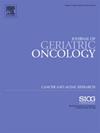Exploring the experiences and perceptions of cancer care treatment decision making for older people with cancer: A qualitative study
IF 3
3区 医学
Q3 GERIATRICS & GERONTOLOGY
引用次数: 0
Abstract
Introduction
Cancer becomes more common as people age. However, little is known about the cancer care experiences of older people. This paper aimed to qualitatively explore experiences and perceptions of older adults with cancer and carers on the impact of ageing on treatment decision-making and cancer care.
Materials and Methods
Self-identified older adults with cancer and independent carers of an older adult with cancer participated in a semi-structured telephone interview. Interviews were audio recorded and transcribed verbatim. Thematic analysis using a framework approach identified key themes.
Results
Nineteen older adults with cancer and nine carers participated. Patient participants had a mean age of 74 years (range 66–90 years), most were diagnosed with blood (n = 9) or breast (n = 8) cancer and had a mean time of 6 years since initial diagnosis. Majority of carers were female (n = 7), providing care for their spouse/partner (n = 6), with a mean age of 63.5 years (range 44–73 years). Thematic analysis identified three themes: (1) Impact of age in treatment decision-making: assumptions and discussions, (2) Factors that influenced patient treatment decisions, and (3) Cancer and ageing-related supports, encompassing the role of the carer and their capacity to provide support.
Discussion
This paper provides insights into the impact of age on cancer care for older adults and questions the underlying assumptions we have when considering an “older” adult and their treatment preferences. Results also highlight the importance of assessment and support for carers.
探讨老年癌症患者癌症护理治疗决策的经验和认知:一项定性研究
随着人们年龄的增长,癌症变得越来越普遍。然而,人们对老年人的癌症护理经验知之甚少。本文旨在定性地探讨老年癌症患者和护理人员对老龄化对治疗决策和癌症护理的影响的经验和看法。材料与方法对自认为患有癌症的老年人和癌症老年人的独立照顾者进行半结构化电话访谈。采访录音并逐字抄写。采用框架方法进行专题分析,确定关键主题。结果19名老年癌症患者和9名护理人员参与了调查。患者参与者的平均年龄为74岁(范围为66-90岁),大多数被诊断为血癌(n = 9)或乳腺癌(n = 8),自首次诊断以来平均时间为6年。大多数照顾者为女性(n = 7),照顾其配偶/伴侣(n = 6),平均年龄为63.5岁(44-73岁)。专题分析确定了三个主题:(1)年龄对治疗决策的影响:假设和讨论;(2)影响患者治疗决策的因素;(3)癌症和老龄化相关支持,包括护理人员的角色及其提供支持的能力。本文提供了年龄对老年人癌症护理的影响的见解,并质疑了我们在考虑“老年人”及其治疗偏好时的潜在假设。结果还强调了对护理人员进行评估和支持的重要性。
本文章由计算机程序翻译,如有差异,请以英文原文为准。
求助全文
约1分钟内获得全文
求助全文
来源期刊

Journal of geriatric oncology
ONCOLOGY-GERIATRICS & GERONTOLOGY
CiteScore
5.30
自引率
10.00%
发文量
379
审稿时长
80 days
期刊介绍:
The Journal of Geriatric Oncology is an international, multidisciplinary journal which is focused on advancing research in the treatment and survivorship issues of older adults with cancer, as well as literature relevant to education and policy development in geriatric oncology.
The journal welcomes the submission of manuscripts in the following categories:
• Original research articles
• Review articles
• Clinical trials
• Education and training articles
• Short communications
• Perspectives
• Meeting reports
• Letters to the Editor.
 求助内容:
求助内容: 应助结果提醒方式:
应助结果提醒方式:


